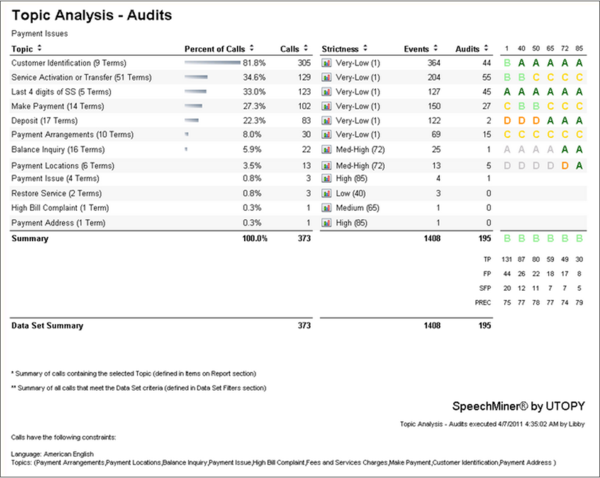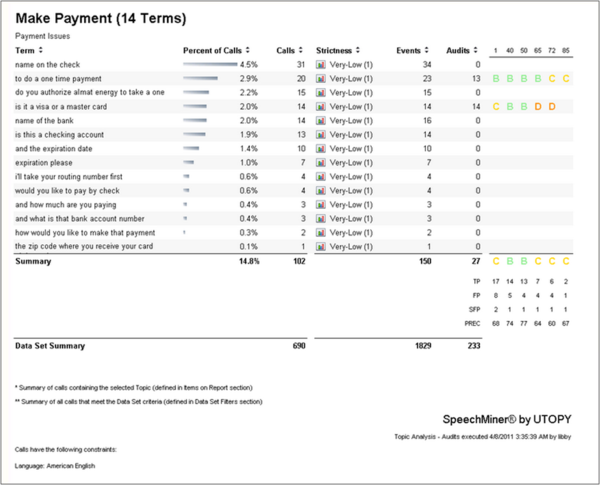Topic Analysis - Audits Report
The Topic Analysis - Audits Report shows the precision with which topics were identified by SpeechMiner. Precision values are given for one or more confidence levels, as specified in the report parameters, and are determined by the True Positive (TP), False Positive (FP) and Sense False Positive (SFP) selections made by the interaction auditor. You can drill down from any topic included in the report to see detailed information about each phrase in the topic.
The goal of auditing is to provide you with data about the precision with which SpeechMiner identifies topics. With this information you can determine whether or not you need to redefine your topics and phrases.
When you run the Topic Analysis - Audits Report, you can select the interactions to include in the data set that will be used for the report. For example, you can select to see information only about specific topics from a specified time range, involving specific agents.
For an example of an audit report see: Report Templates > Topic Analysis - Audits.
Procedure
- Open SpeechMiner and select Reports > Templates.
- Click the Edit link on the Topic Analysis - Audits report line.
- Click Run Report
 .
The Audit Report is created.
.
The Audit Report is created.
The Topic Analysis - Audits report template will open in the Edit tab.
Related Topics
Create a Topic
Auditing a Topic
When an event is rated by SpeechMiner it receives on of the following precision values:
TP (True Positive)
TP occurs when SpeechMiner accurately identifies the phrase it was asked to recognize. The recognition does not have to match the interaction verbatim. Matching the goal of the topic is sufficient. In addition, the phrase must be said in the right context. The right context is provided in the topic definition.
The following table contains example of topics and phrases associated with a TP audit result:
| Topic Name | Text | Identified Interaction |
|---|---|---|
| Escalation (Spoken by customer) | Need to speak to a supervisor | Customer: "I want to speak to your supervisor". |
| Dissatisfaction (Spoken by customer) | Really frustrating | Customer: "This is so frustrating." |
FP (False Positive)
FP occurs when SpeechMiner incorrectly identifies a phrase or topic.
The following table contains example of topics and phrases associated with a FP audit result:
| Topic Name | Text | Identified Interaction |
|---|---|---|
| Escalation (Spoken by customer) | Need to speak to a supervisor | Agent: “you will need to close that visor.” |
| Request to call back (Spoken by agent) | Can you call us back | Customer: "I called my son back yesterday." |
SFP (Sense False Positive)
SFP occurs when SpeechMiner correctly identifies a phrase but the phrase was used in a manner that does not match the intent of the topic. To determine the accurateness of the phrase, review the phrase before and after the marked phrase.
The following table contains example of topics and phrases associated with a SFP audit result:
| Topic Name | Text | Identified Interaction |
|---|---|---|
| Escalation (Spoken by customer) | Need to speak to a supervisor | Agent: “I am going to need to speak to my supervisor.” |
| Double charged (Spoken by customer or agent) | Was double charged | Customer: "I was double charged by my bank." |
Related Topics
Create a Topic
Auditing a Topic


